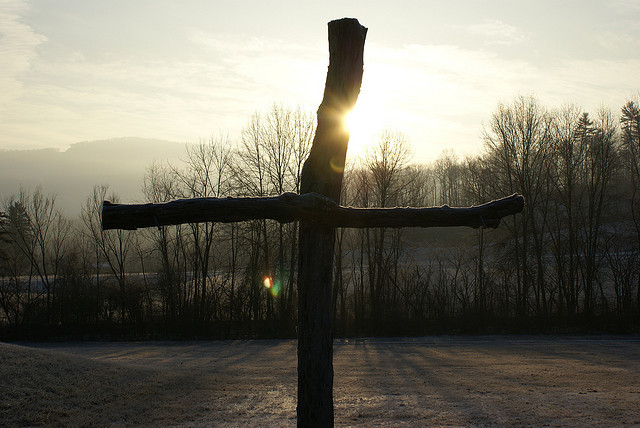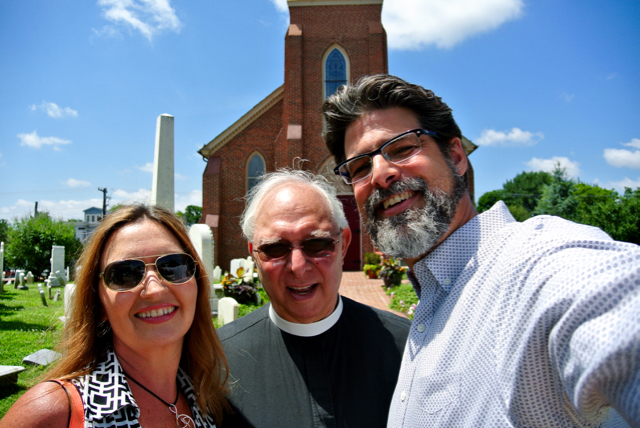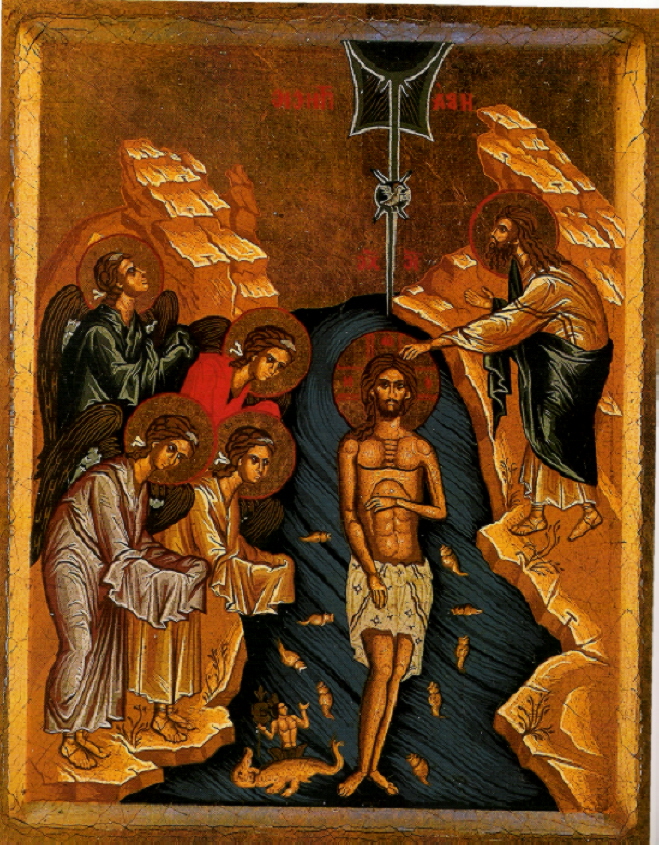As I am sure you all know, George Carlin passed away last week. I have always enjoyed much of Carlin’s work but those of you who know his work will have surmised that I disagreed with his views on religion and God. It just occurred to me that part of one of his routines made up the “base text” of a sermon I preached on Trinity Sunday in 2004.
First Sunday after Pentecost
Trinity Sunday – Year C 2004
Isaiah 6:1-8; Revelation 4:1-11; John 16:(5-11)12-15; Psalm 29 or Canticle 2 or 13
Almighty and everlasting God, you have given to us your servants grace, by the confession of a true faith, to acknowledge the glory of the eternal Trinity, and in the power of your divine Majesty to worship the Unity: Keep us steadfast in this faith and worship, and bring us at last to see you in your one and eternal glory, O Father; who with the Son and the Holy Spirit live and reign, one God, for ever and ever. Amen.
The character and nature of God or What do the Seraphim Sing?
This morning is Trinity Sunday and for some odd reason, although I do not regularly preach, for 3 of the last 4 years I have been asked to preach on Trinity Sunday. As Garrison Keillor pointed out yesterday, the Trinity is always a tough topic to pack into a 20-minute sermon. In reading today’s lectionary I was struck by the fact that the passages from Isaiah and Revelation both are focused on the vision of God upon his throne and the seraphim singing his praise. This led me to reflect more upon the overall character of God than upon just the Trinity per se. And this naturally led me to think about George Carlin.
I say “naturally” because this past Friday as I was driving into work I was listening to the comedy station on XM radio. The first comedian I heard was George Carlin and his routine was “Why God Does Not Exist.” For those of our younger and older set, George Carlin was at his height during the 70s and his character the “Hippy Dippy Weather Man” (“with your hippy dippy weather, man”) best exemplified his style at the time. He has aged more gracefully than some of his era (his is still alive, after all, able somehow to avoid the overdoses that took so many of that crowd), but his irreverence remains. Only now he has, if anything, an even greater sense of condescension towards anything or anyone who disagrees with him. He was always anti-establishment (such rebellion was obligatory for the non-conformists of his age), but religion has been receiving more and more of his ire over the ages. The routine I heard on Friday is his most forthright attack, not on the religion in general, but on God himself. Fortunately for me, someone has posted the content of this routine (© 1999) on the web. I will share with you the most salient points with appropriately adapted language.
But I want you to know something, this is sincere, I want you to know, when it comes to believing in God, I really tried. I really, really tried. I tried to believe that there is a God, who created each of us in His own image and likeness, loves us very much, and keeps a close eye on things. I really tried to believe that, but I gotta tell you, the longer you live, the more you look around, the more you realize, something is ***** up.
Something is wrong here. War, disease, death, destruction, hunger, filth, poverty, torture, crime, corruption, and the Ice Capades. Something is definitely wrong. This is not good work. If this is the best God can do, I am not impressed. Results like these do not belong on the résumé of a Supreme Being. This is the kind of {stuff} you’d expect from an office temp with a bad attitude. And just between you and me, in any decently-run universe, this guy would’ve been out on his all-powerful {rear} a long time ago. And by the way, I say “this guy”, because I firmly believe, looking at these results, that if there is a God, it has to be a man.
George, we are on first name basis, insists that God must not exist because of all the bad things in the world. He is right, of course, that this world is full of the most awful kinds of suffering imaginable. What is even worse is that the most terrible examples of it is created and inflicted upon humans by other humans. And this is the key, fundamental error in Carlin’s comments and criticism of God. Carlin fails to understand, that the evil/suffering/sorrow in this world is not a reflection of God and his character, it is the result of human will. Carlin’s position is the ultimate in hubris as he blames God… well, to be more accurate, he believes he has disproved the existence of God because of what we as humans have done to ourselves and others. His solution, by the way, is to worship the sun because it “treats him fine” and he prays to Joe Pesci because “he looks like a guy who can get things done.” I think he was kidding about this last bit.
The fact is, and what makes Carlin’s routine so poignant and powerful, is that it is hard to reconcile the world of pain and sorrow and suffering that we experience with the concept of a God who loves us and cares about what happens to us. If he cares so much, then why hasn’t he done something about it? Isaiah’s vision of God and his reaction to this experience can, I believe, teach us much about the character and nature of God and what our response should be to him.
The prophet Isaiah lived during the 8th century BC and during his day the Assyrians, that great and fearsome power from Mesopotamia, swept through the region and conquered or subjugated all in their path. Into this context Isaiah received this vision from God calling him to preach to the people of Jerusalem and the kingdom of Judah.
In the year that King Uzziah died, I saw the Lord sitting on a throne, high and lofty; and the hem of his robe filled the temple. Seraphs were in attendance above him; each had six wings: with two they covered their faces, and with two they covered their feet, and with two they flew. And one called to another and said:
“Holy, holy, holy is the LORD of hosts;
the whole earth is full of his glory.”
In this passage, as in John’s vision in Revelation, God is depicted as the mighty king seated upon his throne who is surrounded by his angelic hosts declaring praise to God. It is tempting to refer to the seraphim as cosmic cheerleaders, “God, God, he’s our king, he can do it we will sing! Gooooo God!” Their “cheers” however, are far more profound. Consider also the praises that John heard
Day and night without ceasing they sing,
“Holy, holy, holy,
the Lord God the Almighty,
who was and is and is to come.”
The angels all declare that God is holy. When we speak of a person as being holy we mean that they are very good and are in some way close to God, but what does it mean to say that God is holy? It means that God is nothing less than perfect. He is without flaw or error. In the Isaiah passage the seraphim also declare that “the whole earth is full of his glory.” Elsewhere, the psalmist tells us that all creation declares the glory of God:
Psa. 19.0 To the leader. A Psalm of David.
1 The heavens are telling the glory of God;
and the firmament proclaims his handiwork.
2 Day to day pours forth speech,
and night to night declares knowledge.
Here we have to accept part of Carlin’s critique. The Church cannot very well say that all creation stands as a testament to the glory and handiwork of a perfect God… except for the naughty bits. But it is true. Or at least, we cannot say that without explaining that why it is true. In John’s vision the elders declare,
“You are worthy, our Lord and God,
to receive glory and honor and power,
for you created all things,
and by your will they existed and were created.”
Think back to the beginning of Genesis and the beginning of “the heavens and the earth.” In Genesis 1 with each act of creation God declares that “it is good” and on the final day of his work God declared that it was “very good.” This too is part of God’s character. He is holy and worthy of glory precisely because, in part at least, he has created all that is and his creation is good. So what went wrong? Why is so much of it bad now? Because in his love and perfection God created humanity in his image, allowing us the potential to love him freely and, just as freely, to reject his love. No matter how you understand Genesis 3 and the story of the Garden of Eden, it conveys the fundamental truth that so many (like Carlin) refuse to accept: that so often in our lives, when given the choice between obeying God or taking that which is “pleasing to the eyes” we choose the latter. We disobey God and we are able to disobey God because he created us with the ability to freely choose between loving him and rejecting him.
Carlin’s routine ends with him offering a final proof that God does not exist. “In fact,” he says, “I’m gonna put it this way. If there is a God, may he strike this audience dead! See? Nothing happened.” No one died in that moment in the audience because God loves George, loves them, and loves us enough to allow us to choose whether or not we believe in him, obey him, and love him. But none of that changes the fact that God “was and is and is to come” or that our sin, our willful disobedience of him, has consequences. It does, and those consequences are the atrocities that offend us all.
Yet where God loves us so much that he allows us to reject him, he also loves us so much that he will also offer us his grace and welcome us back into his arms. Consider Isaiah’s experience. He sees God upon his throne and the seraphim declaring God’s holiness and glory and as he does so, Isaiah realizes just how sinful he is, and his people as well. In the presence of God he realizes his own inadequacies.
And I said: “Woe is me! I am lost, for I am a man of unclean lips, and I live among a people of unclean lips; yet my eyes have seen the King, the LORD of hosts!”
This too ought to be our response to God, to realize that while he is holy, we are not. This is not to dwell in some sort of self-flagellation, certainly there are some Christian traditions that have over emphasized the depravity of humanity so that some carry guilt that they believe is too great even for God to carry. One the other hand, we stand in a tradition that is often on the other end of the spectrum, embracing too fully the notion that we are all “OK” just as we are. The point is that in the presence of God, in the Holy of Holies, we should realize as Isaiah does, that we are not without sin and we must confess and declare that to God. “Most merciful God, we confess that we have sinned against you in thought and word and deed.”
And God’s response is to cleanse us, to forgive us and make us new and whole. Remember what I said a moment ago, his love that was so great as to allow us to reject him is also great enough to welcome us back when we return. It is always in his nature to have mercy. Notice the response to Isaiah,
Then one of the seraphs flew to me, holding a live coal that had been taken from the altar with a pair of tongs. The seraph touched my mouth with it and said: “Now that this has touched your lips, your guilt has departed and your sin is blotted out.” Then I heard the voice of the Lord saying, “Whom shall I send, and who will go for us?”
This is nothing less than salvation; it is what we experience when we come before this altar, confessing our sins and accepting Christ’s sacrifice as our own. This is the character and nature of God: he is holy and in his love he receives the penitent. He cleanses us and prepares us for his service. For after God purifies Isaiah he calls and asks, “Whom shall I send, and who will go for us?”
God’s question is the answer to Carlin’s objection. Yes, suffering and hardship and all manner of evil continue to exist in this world. Why? Not simply because God has allowed humanity the freedom to sin, but because so many who have returned to God, so many of us who have been cleansed of our guilt and sin, have not answered God’s call, “Whom shall I send and who will go for us?” The suffering is not a sign of God’s absence; it is a sign of our inaction. God can and will ultimately step into history and transform it all in a moment. Yet at this time, he asks us to work with him, he offers to use us each to do his great work in this world. We are his hands and his feet. The trouble is we have atrophied; we have withered and become unresponsive.
You have been in the Temple and seen God in all his glory. Perhaps it was while praying one night in your room, or walking in the woods, or talking with a friend, but you have felt the forgiveness and the healing power of God’s touch. God has made you and now you are a new creation in Christ. And he asks you, “Whom shall I send, and who will go for me?”
Will we answer with Isaiah, “Here am I; Send me”?





3 thoughts on “George Carlin and the existence of God”
Thanks for sharing this – it is a nice antidote to Mugabe and Gafcon and two fire alarms in my building this week from people who can’t avoid burning toast.
I felt angry, sad and dirty watching Carlin’s attack on God. I also think Carlin a comedic genius. The sad part comes from the two and one half million people who watched the video. Most of them before Carlin died. His influence on minds and souls was powerful.
I was hoping to see that he had come to some relationship with Christ so that there might be hope for him. That seems remote given his convictions. Thank you for putting it all in biblical perspective.